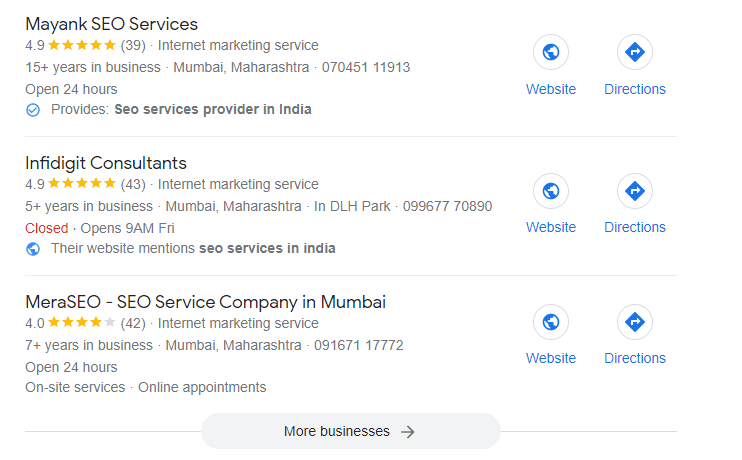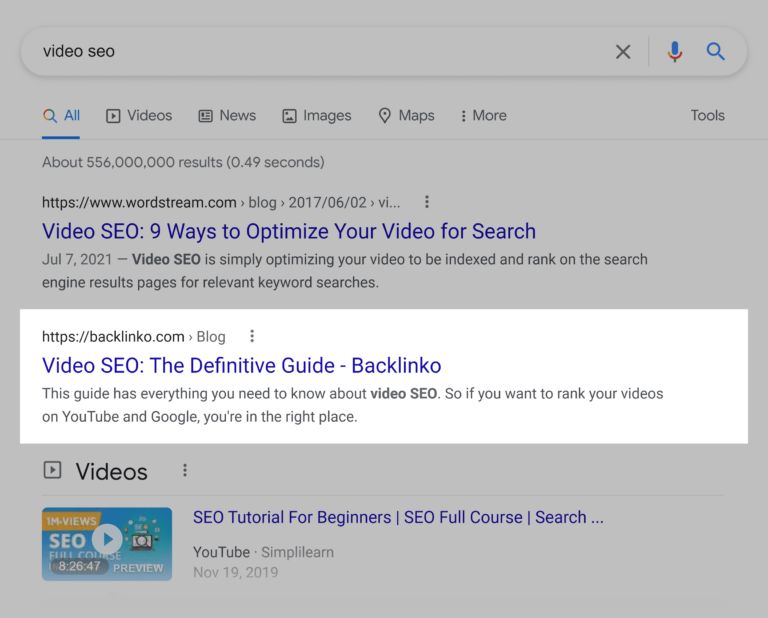A Local SEO Guide for Large Enterprises and Franchises
Local SEO is a pretty complex beast. There are many moving parts that are simply not part of an organic business strategy.
And when it comes to franchising and local SEO it can get even more complex as the answer “who is responsible for local SEO” is vague at best.
In this article, we will discuss the challenges businesses/franchises have when it comes to local SEO.
First, let’s talk about this: why do companies tend to view local SEO as a grocery checklist?
In short, local SEO fails when companies don’t have a well-structured plan.
Common misconceptions include: “If I complete A, B, and C, my local presence will improve” or “If we are doing traditional SEO, then local will fit.”
For local SEO to be successful, companies must define what success looks like and develop an ongoing plan that is scalable.
While companies of any size can be susceptible to this mindset, it is large companies and franchise systems that are most at risk of falling into this trap.
5 Challenges Enterprises/Franchises Face When Planning A Local SEO Strategy
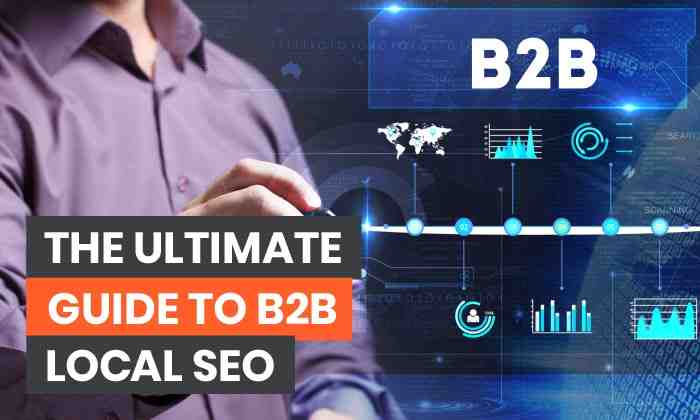
Regardless of the channel, large companies have built-in advantages over small competitors, including but not limited to:
While these built-in features will certainly help, if ignored, the cons of larger companies with 100+ locations will outweigh the pros – especially when it comes to local SEO.
1. Budget
A common pain point I hear when I’m talking to a company/franchise is how XYZ’s tactic isn’t in the budget.
So let’s say you have a scalable, frictionless way to get local managers/owners to upload photos to a Google business profile.
Now this is going to help solve a big problem that companies/franchises have. And every time I talk to one, they agree that they need something like this.
But when it comes to financing, they won’t pay for it. The funds might be better spent on something like AdWords, they say.
Why this line of thinking? Simply because most SEO activity cannot be traced back to a hard line ROI where you spend $X and get $Y.
The CFO or other stakeholders prefer to play it safe, keep the status quo, not rock the boat and let their numbers keep looking good. #politics
2. Ignorance Is Bliss
If there has never been a defined strategy across the organization, it can be difficult to get buy-in from others. I see this in many organizations.
If they have a vaguely planned strategy and roles haven’t been defined, a stakeholder can easily say, “I’m not sure what X or Y or Z is doing and I think they own the place, or part of it, and they really need it.” decide .”
Then the money is passed on to someone else who feels the same way.
3. Slow Decision Making
Large companies are often not as adaptable and flexible as small companies.
A simple decision is achieved by including 10 people in the decision-making process, some of whom have nothing to do with the solution.
And then you have those #policies I mentioned.
When dealing with a large company, I came across a situation where the social media team made local decisions… and the head of that team was related to the CEO.
Guess who gave the orders but never went to meetings?
Also, the only person qualified to be responsible for the location was handling other aspects of digital marketing.
Consequently, tasks that should be obvious – claiming local listings, hiring a new supplier, etc. – can drag on for months.
I’ve seen companies regret not having the urgency to claim listings.
Something as simple as changing phone numbers can result in local map traffic dropping due to data inconsistencies.
In drastic cases, unclaimed and outdated listings caused Google business profile traffic to drop by more than 50%.
Then there’s a simple conversation about how to comply with Google Business Profiles, which, if not addressed, could result in account-level suspensions.
One franchise had different naming conventions for each franchisee and was using home addresses for each location, so we are not compliant with Google guidelines.
I spoke to them in January about helping them comply.
The conversation lasted more than eight months and included six departments. At the end of the day, the CFO crushed the idea.
The solution wouldn’t cost that much. But in month 11, suddenly 75% of the units went dark. It was an account-level suspension. This lasted two months.
It’s two months of lost revenue, some franchises going bankrupt and a huge headache.
4. ‘Bystander Effect’
The lack of defined roles combined with the fact that the company has many people on the marketing team can lead to widespread responsibility and many accusations.
A common local task that falls victim to the “Bystander Effect” is revision management.
Who should be responsible for responding? Customer service? Store managers? Regional managers?
The truth is, there is no right answer – pick one, but make sure the job gets done. And make responsibilities clear.
One thing to note here, franchisors have a unique problem when it comes to liability.
Businesses can also face this problem, but not as much as franchisors, as they usually work in one of the few types of franchise systems.
an. The franchisor controls the marketing.
This is rare, but ideal because the responsibility lies with the franchisor. You may still have the above issues of slow movement, budget, and functions, but the decisions are happening in one place.
B. The franchisor sets up the GBP and delivers it to the franchisee.
The franchisee takes over your marketing from there. This causes a number of problems such as inconsistencies.
It often also results in inaction on the part of franchisees simply because they are in their franchise business – not their local marketing or SEO business.
ç. Franchisees share a marketing pool.
The best system I’ve seen is where there is a fund for franchisees to spend on marketing.
They can make a decision and the franchisor has a preferred vendor marketplace where the franchisee earns a percentage discount for using an approved vendor.
5. Scalability
Volume is without a doubt the biggest hurdle to overcome.
Let’s use Google’s Q&A feature as an example: 100 locations x 3 questions/month x 5 minutes per answer = 25 hours/month.
And that’s a conservative estimate that only represents a small component of local SEO.
The good news is that a well-defined plan not only overcomes the obstacles listed above, but produces a successful and scalable local SEO strategy.
Before we expand on actionable local SEO plans, it’s important to point out the often-overlooked first steps:
Mandatory digital marketing goals: Define what success means for local SEO.
Common goals include increases in:
Establish roles and responsibilities: Just like any other team effort, local SEO requires a team.
5 Local SEO Best Practices For Enterprises/Franchises
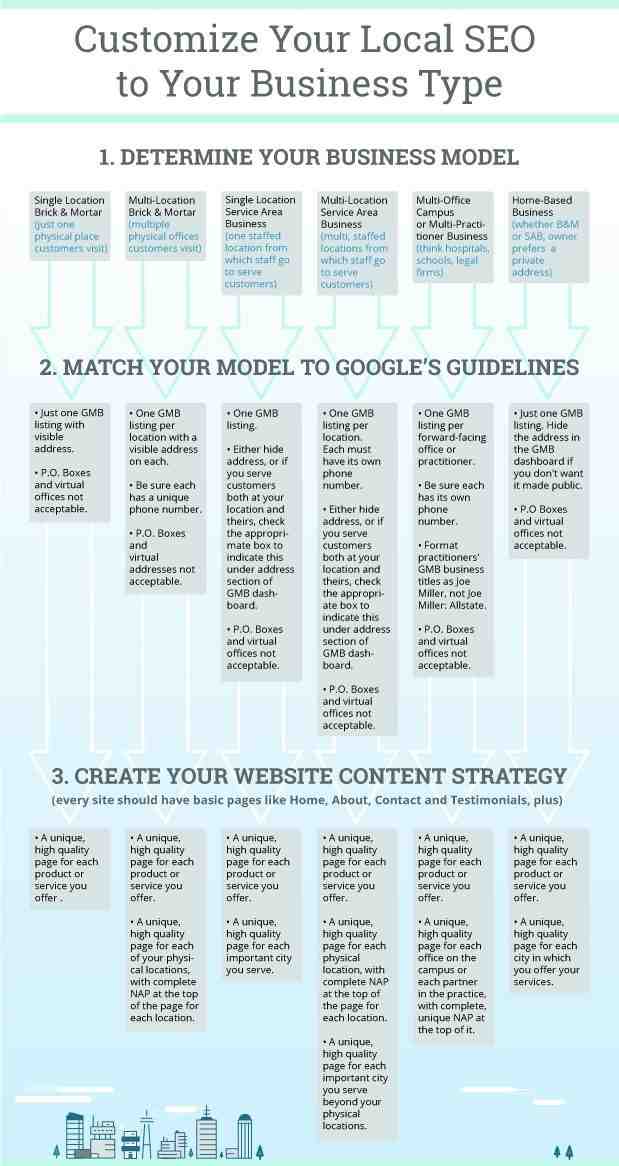
Below are five local SEO practices that will help you achieve your business goals. Each section has been divided into:
(In most cases, they should be implemented, but considered more like a baseline. In some sections, the baseline doesn’t exist, so I’ve listed what not to do.)
Essentially, some companies do the basics and think they’re done or choose to stick their heads in the sand.
(See Creating Local Links, Managing Reviews, and Managing Citations in the steps outlined below for examples.)
This will separate your business from the competition – if for no other reason, most follow the basic approach!
1. On-Page Local SEO
Competitive Advantage Practices Requiring Management and Ongoing; Planning
an. Create and implement a plan for local content opportunities.
They can be embedded in a blog or directly on store locator pages to help differentiate hundreds of similar store pages.
The content doesn’t necessarily have to be about the products you sell.
In fact, focus most of your content on anything but selling your product.
Do about something that is useful and helpful to your customer/audience.
B. Take a disciplined and consistent approach to adding new content to your store pages.
Content ideas include unique store photos, videos, store manager profiles, or other local city information related to your business.
ç. Make a plan for ongoing content production.
I’m talking blog posts, white papers, case studies, social media, GBP and other forms of content. Make plans for local content that matches the tones of the locale.
A simple way to create unique store pages is to add small, localized paragraphs to each location.
2. Google Business Profiles
Competitive Advantage Practices Requiring Management and Ongoing; Planning
an. Invest in a tool like GatherUp or GradeUS.
These tools have enterprise features that allow managers to receive notifications whenever a user leaves a review, among many other local management features.
Then create some generalized templates that service reps can refer to when responding to customer feedback.
B. Create a monthly calendar to use optional but useful features like Google Posts, Product Posts, and Google Q&A.
Establish guidelines on how often you use Google Posts, what types of content to publish, and how to get non-stock images.
ç. Upload images weekly, preferably from the location.
d. Change store hours to reflect store closings and special holiday hours.
Google Business Profiles allow managers to bulk upload store hours changes.
(This is usually controlled at the corporate level if they are managing listings or through a listing provider like Yext).
and. Establish a culture that consistently analyzes the competitive landscape in Local Pack.
Regularly check local rankings for important keywords using tools like Local Rank Tracker, MobileMoxie or Local Falcon.
These tools are great because they allow you to check local rankings without searching for a location modifier (e.g. sushi restaurants in Austin).
Be a whistleblower about others spamming GBP. Common culprits are keyword stuffing or adding locations directly into the business name.
g. Attach unique UTMs to your local and GBP directories.
Analyze traffic directly in Google Analytics. While GBP provides data directly in the interface, I find it useful to include the data in GA reports.
H. Enable messages and quotes/bookings/orders in GBP (if available).
Then decide who will be responsible for that resource.
Certain tools like Podium will help you scale this. (Note: Subscribe to Local Service Ads if available.)
3. Local Link Building
Competitive Advantage Practices Requiring Management and Ongoing; Planning
an. Big brands are involved in the community but fail to maximize their involvement from a bonding perspective.
Take inventory of all public relations events and establish an outreach process to ensure you get a link back.
Get involved in your community. Sponsor events. Support other businesses. Host networking events.
Most recipients will gladly link back to their local store page, some just need a reminder.
B. Brands tend to think really big, whereas local SEO is… well, it’s local!
Don’t get bogged down in national-level thinking and overwhelmed by the crazy number of locations you manage.
Start small and gradually build a process for other locations.
Better yet, after experiencing success in a local market, let that local manager become your inner advocate.
ç. Develop a cohesive process for local managers/owners to follow.
Explore sponsorships, scholarships, workshops, conferences and news opportunities.
4. Citation Management
Competitive Advantage Practices Requiring Management and Ongoing; Planning
an. Use Yext or Moz Local to create, verify and optimize listings for brands from multiple locations.
These are scalable tools perfect for companies with 100+ stores. They help you submit citations, clean up duplicate data, adjust incorrect data, and defend your online presence.
B. Assign designated resources to actively monitor and update information.
Always try to improve the listings.
No doubt, problems will occur and you want someone to be able to make the appropriate branding decisions when they come across questionable content.
ç. Create quotes for TripAdvisor, Yelp or other industry-specific platforms.
Look for those that aren’t auto-generated with a tool like Moz Local, as well as local citation opportunities like the Chamber of Commerce.
5. Reviews
Basic practices (which many do, don’t be one of them!)
Competitive Advantage Practices Requiring Management and Ongoing; Planning
an. Prioritize managing timely revisions.
Fully 78% of customers focus on the most recent reviews and 69% are more likely to use a business that has responded to existing reviews.
B. Ask all customers to leave comments (no incentives).
This can be managed through an internal CRM system or automated tools like GatherUp. Review takeover is a simple numbers game. The more you ask, the more you get.
ç. Respond to all criticism, good and bad.
Consumers expect to see a bad review here and there, but how you respond is key. Think about how another customer will feel after reading your response.
Summary

When in doubt about local SEO, focus on tasks that add value and solve problems for customers.
This is an obvious point, but the underlying principle is valuable, and many don’t.
In general, consumers are lazy and selfish (as are all of us).
It’s our job to make their lives as easy as possible.
Customers are more likely to support, seek out and refer brands they truly care about.
Featured Image: Paulo Bobita/Search Engine Journal
How do I choose a company for SEO?

Follow these 6 tips to choose the best SEO company
- Ask for case studies and examples of successful SEO campaigns.
- Think beyond SEO.
- Visit the SEO company in person.
- Understand the risks of low-cost SEO agencies.
- Avoid SEO guarantees.
- Familiarize yourself with SEO pricing models and establish an SEO budget.
What is the best company for SEO services?
What makes an SEO company good?
High level of understanding is a typical characteristic of a good SEO company. … Off-page SEO factors involve generating backlinks, link building, and so on. You need to make sure that the so-called best SEO company you are hiring for your SEO needs knows all about your on-page and off-page SEO needs.
What makes an SEO company best?
Any company that promises overnight success doesn’t know enough about SEO or what it’s doing. In short, great SEO companies don’t make crazy promises; they show what is possible and how they will work hard to achieve it. If you give them time, you will start to see results – qualified traffic, leads and sales.
Is hiring a SEO company worth it?
Yes: For many businesses, it makes sense to use SEO as an ongoing, long-term strategy to generate revenue, because that’s what SEO does. Hiring an SEO company helps your business earn more from SEO by providing access to advanced marketing technology, experienced SEO experts, and more.
When should I hire my SEO company?
You can use free keyword research tools to determine the difficulty of your target keyword. If your keyword has a medium to high difficulty score, strongly consider hiring an SEO company to help you rank organically.
Can SEO make you rich?
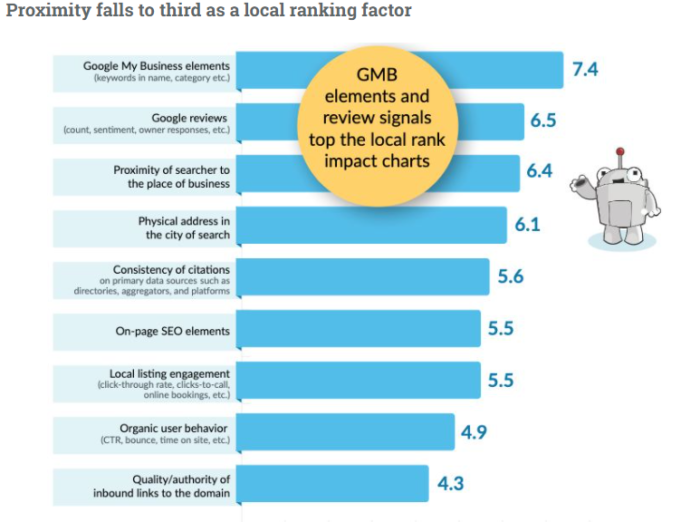
Yes, SEO can make you rich if you know what you are doing. In fact: SEO has helped me eliminate all debt and build my net worth beyond what I thought possible.
Is SEO a good investment? SEO isn’t just necessary for your business, it’s one of the biggest investments you can make. You can think of SEO as investing money in a 401K for your business – it’s money that will gain value over time and stay in your account.
Can SEO make you millionaire?
If you’re looking for a way to get rich quick, SEO (Search Engine Optimization) is absolutely the way to go. It’s incredibly EASY to make a lot of money from SEO! All you need to do is follow the checklist below, then sit back and marvel as you accumulate riches beyond your WILDEST DREAMS!
Is SEO worth it in 2022?
Local SEO will thrive in search results: Local SEO will be effective in online marketing in 2022 and even if the pandemic is gone, studies and research say that people prefer to work and study from home and will likely do so even after the pandemic.
Can you make a lot of money with SEO?
The simple answer is that SEO can be a great way to earn a decent living, and as long as you have the skills to scale an SEO practice, the sky is the limit. These days, there are many ways to make money online: from building an e-commerce website to creating a blog to promote products and services.
How much can you make from SEO?
On average, an SEO specialist earns $49,000 a year, with average salaries for SEO managers being significantly higher at around $63,000. At the top are SEO directors – who typically earn between $70,000 and $120,000 – and SEO team managers and campaign managers, in the $50,000 to $100,000 range.
Is SEO worth it 2021?
The short answer is that SEO is very effective – not just for generating traffic, but also leads and sales. Do not worry. The long answer includes search and data, not just empty statements. Most SEOs get very stuck on specific search metrics like SERPs (search engine results page), rankings, and organic traffic.
Is SEO Worth It in 2022? Local SEO will thrive in search results: Local SEO will be effective in online marketing in 2022 and even if the pandemic is gone, studies and research say that people prefer to work and study from home and will likely do so even after the pandemic.
Why does SEO still matter in 2021?
SEO remains relevant in 2021 and savvy marketers should find ways to use content marketing alongside other interesting traffic channels like social media management. SEO is a form of inbound marketing that extends your brand’s reach through long-tail keyword targeting.
Why do you need SEO in 2021?
In short, SEO is crucial because it makes your website more visible, and that means more traffic and more opportunities to convert prospects into customers. Check out the SEO tools you can use for optimal ranking.
Is SEO still relevant in 2021?
SEO still remains relevant and vital in 2021 if you want your business to have an effective online presence.
How SEO will change in 2021?
Google Page Experience Update One of the biggest announcements about the SEO changes coming out of Google this year, the Page Experience Update essentially confirms that user experience will become an SEO ranking signal sometime in 2021.
How long does SEO take to show results in 2021?
The short answer is between 4-12 months. The longer answer has to do with all the factors we’ve discussed that tie into your SEO strategy. If you target low competition keywords, you can start seeing results in 4-6 months.
Is SEO still relevant in 2021?
SEO still remains relevant and vital in 2021 if you want your business to have an effective online presence.
How long does it take to get results from SEO?
Unlike other popular marketing channels, SEO doesn’t work instantly. Most professionals expect to see results in as little as 2 months, but SEO can take up to 12 months to work. While each company’s SEO strategy is different, most companies can expect considerable results within 6-12 months.
How long does it take to rank on Google 2021?
Most of them achieved this in approximately 61-182 days. Looking at this graph, you might think that, on average, a page takes 2-6 months to appear in Google’s Top 10.
Are keywords still important for SEO 2021?
In 2021, keywords are still important and useful in SEO, but they are not the most important factor. This is because SEO is much more complex than putting keywords on a page. Also, since SEO is always changing with search engines continually updating algorithms, marketers need to change the way they are using keywords.
Are keywords still important for SEO?
You might also think that search engines put less emphasis on keywords than they used to, but those assumptions also need to be challenged. The truth is, keyword research is still important for SEO, and I would say it is the most important step in the whole process.
Does SEO still work in 2021?
So is SEO still a good investment in 2021 and beyond?! Short answer: YES! SEO is more important than ever! It is still one of the most potent digital marketing strategies that generate long-term results.
How SEO will change in 2021?
Google Page Experience Update One of the biggest announcements about the SEO changes coming out of Google this year, the Page Experience Update essentially confirms that user experience will become an SEO ranking signal sometime in 2021.
Who is the World No 1 SEO expert?
1. Rand Fishkin. He is among the world’s leading SEO experts, former CEO of Moz, Rand Fishkin is the CEO and co-founder of SEOmoz, a leader in the field of search engine optimization tools, resources and community.
Who is the best SEO expert in India? Answer: Sunil Chaudhary is the best SEO expert in India as he is the one who can rank your business on the first page of major search engines for potentially more revenue generating keywords. Sunil Chaudhary only uses the 2021 WHITE HAT SEO Techniques.
Who is the best SEO expert Dubai?
Best SEO Dubai Advisor Shinoy Rajendraprasad is one of the best SEO Dubai experts at JLT. It will help you to increase the likelihood of your business online and offer cost-effective digital marketing services. He is working as a Digital Marketing Specialist and IT Engineer at JLT and providing the latest advertising services.
Who is the best SEO expert JLT?
Shinoy Rajendraprasad is the best SEO expert in Dubai at JLT. Furthermore, he has 6 successful years as a Computer Engineer. He is currently living at JLT working as a Digital Marketing Specialist and IT Engineer in Dubai.
How much does SEO cost in Dubai?
The cost of SEO is usually monthly. The range of this cost would be from 1,000 AED to 30,000 AED per month.
Who is SEO Guru?
SEO Guru is a customer-focused SEO focused agency. Our business is your business! If you want better quality leads and better website traffic, talk to The Guru!
Who is Neil Patel SEO?
Who is Neil Patel? He is a New York Times bestselling author. The Wall Street Journal calls him one of the top influencers on the web, Forbes says he is a top 10 marketer, and Entrepreneur Magazine says he created one of the 100 brightest companies.
